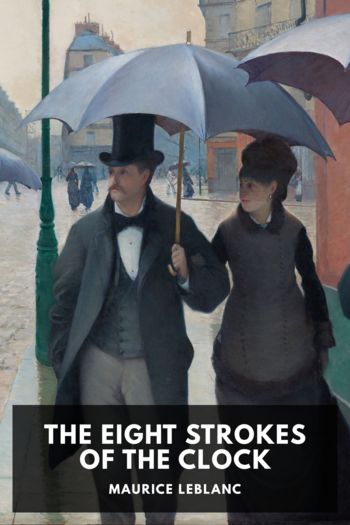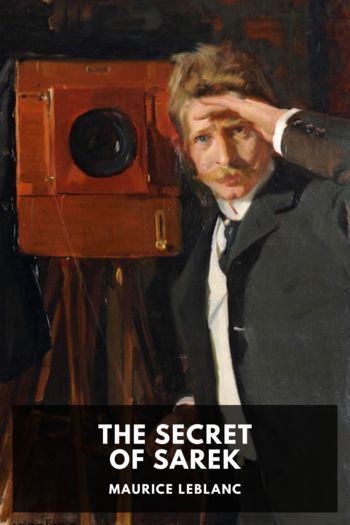The Eight Strokes of the Clock - Maurice Leblanc (reading in the dark .TXT) 📗

- Author: Maurice Leblanc
Book online «The Eight Strokes of the Clock - Maurice Leblanc (reading in the dark .TXT) 📗». Author Maurice Leblanc
“Madame, I do not know what I can do for you. But I give you my word of honour that, if anyone in this world can be of use to you, it is myself. I therefore implore you to answer my questions as though the clear and definite wording of your replies were able to alter the aspect of things and as though you wished to make me share your opinion of Jacques Aubrieux. For he is innocent, is he not?”
“Oh, sir, indeed he is!” she exclaimed; and the woman’s whole soul was in the words.
“You are certain of it. But you were unable to communicate your certainty to the court. Well, you must now compel me to share it. I am not asking you to go into details and to live again through the hideous torment which you have suffered, but merely to answer certain questions. Will you do this?”
“I will.”
Rénine’s influence over her was complete. With a few sentences Rénine had succeeded in subduing her and inspiring her with the will to obey. And once more Hortense realized all the man’s power, authority and persuasion.
“What was your husband?” he asked, after begging the mother and Gaston Dutreuil to preserve absolute silence.
“An insurance-broker.”
“Lucky in business?”
“Until last year, yes.”
“So there have been financial difficulties during the past few months?”
“Yes.”
“And the murder was committed when?”
“Last March, on a Sunday.”
“Who was the victim?”
“A distant cousin, M. Guillaume, who lived at Suresnes.”
“What was the sum stolen?”
“Sixty thousand-franc notes, which this cousin had received the day before, in payment of a long-outstanding debt.”
“Did your husband know that?”
“Yes. His cousin told him of it on the Sunday, in the course of a conversation on the telephone, and Jacques insisted that his cousin ought not to keep so large a sum in the house and that he ought to pay it into a bank next day.”
“Was this in the morning?”
“At one o’clock in the afternoon. Jacques was to have gone to M. Guillaume on his motorcycle. But he felt tired and told him that he would not go out. So he remained here all day.”
“Alone?”
“Yes. The two servants were out. I went to the Cinéma des Ternes with my mother and our friend Dutreuil. In the evening, we learnt that M. Guillaume had been murdered. Next morning, Jacques was arrested.”
“On what evidence?”
The poor creature hesitated to reply: the evidence of guilt had evidently been overwhelming. Then, obeying a sign from Rénine, she answered without a pause:
“The murderer went to Suresnes on a motorcycle and the tracks discovered were those of my husband’s machine. They found a handkerchief with my husband’s initials; and the revolver which was used belonged to him. Lastly, one of our neighbours maintains that he saw my husband go out on his bicycle at three o’clock and another that he saw him come in at half-past four. The murder was committed at four o’clock.”
“And what does Jacques Aubrieux say in his defence?”
“He declares that he slept all the afternoon. During that time, someone came who managed to unlock the cycle-shed and take the motorcycle to go to Suresnes. As for the handkerchief and the revolver, they were in the tool-bag. There would be nothing surprising in the murderer’s using them.”
“It seems a plausible explanation.”
“Yes, but the prosecution raised two objections. In the first place, nobody, absolutely nobody, knew that my husband was going to stay at home all day, because, on the contrary, it was his habit to go out on his motorcycle every Sunday afternoon.”
“And the second objection?”
She flushed and murmured:
“The murderer went to the pantry at M. Guillaume’s and drank half a bottle of wine straight out of the bottle, which shows my husband’s fingerprints.”
It seemed as though her strength was exhausted and as though, at the same time, the unconscious hope which Rénine’s intervention had awakened in her had suddenly vanished before the accumulation of adverse facts. Again she collapsed, withdrawn into a sort of silent meditation from which Hortense’s affectionate attentions were unable to distract her.
The mother stammered:
“He’s not guilty, is he, sir? And they can’t punish an innocent man. They haven’t the right to kill my daughter. Oh dear, oh dear, what have we done to be tortured like this? My poor little Madeleine!”
“She will kill herself,” said Dutreuil, in a scared voice. “She will never be able to endure the idea that they are guillotining Jacques. She will kill herself presently … this very night. …”
Rénine was striding up and down the room.
“You can do nothing for her, can you?” asked Hortense.
“It’s half-past eleven now,” he replied, in an anxious tone, “and it’s to happen tomorrow morning.”
“Do you think he’s guilty?”
“I don’t know. … I don’t know. … The poor woman’s conviction is too impressive to be neglected. When two people have lived together for years, they can hardly be mistaken about each other to that degree. And yet. …”
He stretched himself out on a sofa and lit a cigarette. He smoked three in succession, without a word from anyone to interrupt his train of thought. From time to time he looked at his watch. Every minute was of such importance!
At last he went back to Madeleine Aubrieux, took her hands and said, very gently:
“You must not kill yourself. There is hope left until the last minute has come; and I promise you that, for my part, I will not be disheartened until that last minute. But I need your calmness and your confidence.”
“I will be calm,” she said, with a pitiable air.
“And confident?”
“And confident.”
“Well, wait for me. I shall be back in two hours from now. Will you come with us, M. Dutreuil?”
As they were stepping into his car, he asked the young man:
“Do you know any small, unfrequented restaurant, not too far inside Paris?”
“There’s the Brasserie Lutetia, on the ground-floor of the house in which I live, on the Place des Ternes.”
“Capital. That will be very handy.”
They scarcely spoke on the way. Rénine, however, said to Gaston Dutreuil:
“So far as I





Comments (0)